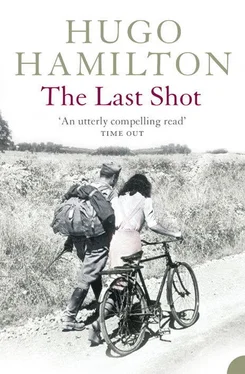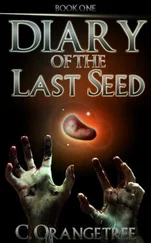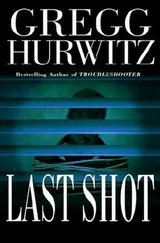‘Halt,’ Kern said. ‘I hear something.’
She stopped abruptly and fell silent. There was nothing to laugh about. Neither of them said a word. They listened.
After a while, when they were sure it was nothing, she settled down and fell asleep. With Franz Kern, she felt safe enough to sleep. Nothing mattered any more.
Kern stayed awake. An ingrained war mentality. He heard every crack, every microscopic night-time noise on the hillside juxtaposed on to the distant sound of endless traffic along the road below. He had spent the war years listening to radio signals. He only fell asleep just before dawn when the birds set up such a shrill contest of noise that it drowned out every other sound, and every danger.
Somewhere between the night of the 10th and the morning of the 11th of May, all formality was lost between them. They had begun to call each other by first names. Bertha and Franz.
Jürgen took me to see his new practice. He had claimed me to himself after dinner while Anke put Alex to bed. It was a duty she enjoyed. It took an hour, often longer, to put Alex to bed. They agreed quite amicably about it. ‘You have the whole day tomorrow,’ Jürgen said to her.
Jürgen’s practice looked more like a reception in an advertising agency than the rooms of a gynaecologist. The reception itself was a jungle with tropical plants and fish-tanks. The fish-tanks came from his father’s practice, and Jürgen told me how his father used to scrape the green crust off the glass with a blade every Saturday. He told me how he once saw the blade snap in his father’s fingers, and one of the larger fish swam up and swallowed a small shard of it.
Above the reception desk, there was a large, commanding poster of a stork in flight carrying a baby wrapped in swaddling clothes. Elsewhere there were other maternity posters from the fifties and newer posters about AIDS.
Jürgen showed me how the practice was designed with three surgeries, each with well-planned interlinking doors so that he could pass from one to the other, minimizing the time delay between patients. The nurses ran the operation very smoothly, indicating which room was next.
Jürgen and I sat in one of the surgeries talking about his success. I sat in the doctor’s seat while Jürgen sat on an examining couch, swinging his legs. He spoke with an infallible doctor’s touch.
He told me that he had taken on two assistant gynaecologists. But he was still looking at new ways to make each examination more efficient. They had already ensured that women undergoing examination were in the chair, undressed and waiting under a white towel when the doctor came in. There was a special examining chair in which the woman was hoisted up, legs splayed apart.
Had he become dispassionate about women, I asked. Was it difficult to take his mind off women?
‘I don’t see women in this surgery – I only see patients.’
He was taken aback by my question, as though I had undermined his professional integrity. But then he understood, everything belonged to the realm of serious inquiry. I began to play with an instrument lying on his desk.
‘I talk to them in the third person. I make no connection between their vaginas and their faces. The only comparisons I make are for health reasons. The only thing that arouses my attention or my interest is disease and problems. Actually, the only time I am ever reminded that they are women is with some of my Turkish patients. They will take off all their clothes except the head-dress.’
I was playing with some kind of torch in my hands. I looked at the red light that shone through the gaps in my fingers every time I lit it.
‘I examine the prostitutes of Münster as well. It’s part of the work I do for the city. My father used to do it too. Every week I examine them and give them disease-free certificates. Without it they can’t work.’
It was a while before I realized that the torch in my hand was specifically designed for gynaecological examinations. I put it back and went over to the window. I stood looking down over the square where work on new paving had been abandoned for the weekend. Shallow sandpits into which the paving stones would be placed were cordoned off by red and white tape. A tool shed stood in the middle. A woman waited while her dog on a leash crouched in a sand dune.
‘You came at the right time,’ Jürgen said.
It became clear that he had brought me here to talk about something else. Perhaps Anke? For a moment, I thought he was going to drag up the past. The crash.
‘Anke can get very unhappy sometimes,’ he said. ‘She will do everything for Alex. But things are difficult for her. It’s hard for me too, but I understand, because I’m a doctor. I can detach myself from the world, from the emotion. I am used to suppressing emotions.’
‘She has gone back to college again?’ I asked.
‘Yes. She decided that she needed to think about something else. She has to progress. With Alex, she can be so depressed. She has to feel she is going somewhere.’
He came over and stood by the window. There was some premonition in his words. We were both looking out through parallel blinds at the Sunday evening square. There was nobody out there now. I was leaning with my elbow on the window frame. Jürgen’s eyes were looking at me.
‘Alex is very ill. You know that. He’s got leukaemia. He won’t live long.’
I expressed shock. Jürgen quickly ran through a medical explanation, giving me the causes, treatment and long-term outlook on leukaemia. There was little hope in Alex’s case. I wondered if this was Jürgen’s way of protecting himself from his own emotions. When things went wrong, he turned into a doctor.
‘It’s good to talk to you,’ he said. ‘Anke and I still find it impossible to discuss it. Together, we still hope it’s not true.’
Jürgen pulled me away from the window. He suggested going for a drink. There was nothing more anyone could say about Alex. Nothing I could say to help.
‘You know,’ Jürgen said. ‘If Alex had been born in the Third Reich, he would have been eliminated – life unworthy of life. In ten years’ time, his condition will be quite routinely picked up at the embryo stage. I feel lucky for him. Alex is like a refugee. We feel as though we’ve saved his life. Part of his life, anyway.’
In the lift going back down, I offered more encouragement. Jürgen said they were happier with Alexander than they might ever have been without him.
We walked across the square, finding our way along between the sandpits and the mounds of new paving stones. We went for a quiet drink on the way home. Anke was already asleep when we arrived back. Jürgen showed me my room, and when I got into bed I found a piece of chocolate cake, half-eaten, under the sheet. At first I thought it was Anke’s idea of a little joke. Then I realized it must have been Alexander. It was a gift.
The following morning, Alexander was collected by bus to go to his special school. Everybody’s life was worked out with sheer precision. Jürgen spent the day at the practice and later in the afternoon went on to the local hospital. Anke normally went to the university, where she had gone back to take up social sciences. That Monday morning she was having a long drawn-out breakfast. She was going to show me around Münster.
She suggested the bikes.
I took Jürgen’s bike. I love these German bikes where you can back-pedal to brake. We spent all morning cycling through the cobbled streets.
‘What’s Münster got?’ I shouted after her.
‘It’s got everything the heart could desire.’ She knows how to answer with extreme irony. To say something without irony is leaving yourself open, unprotected.
Читать дальше
Конец ознакомительного отрывка
Купить книгу












